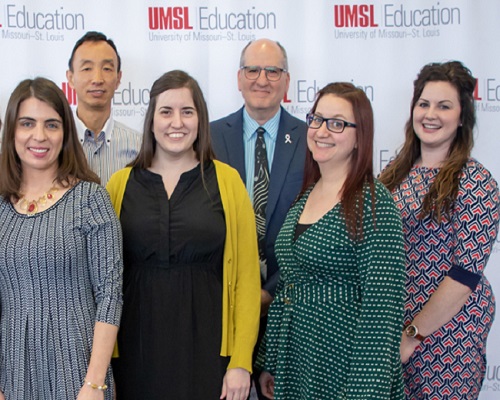Take the science of learning to the highest level with a Ph.D. in Educational Psychology
There is still so much to learn about how people actually learn. For example, what influences a person’s ability to retain information? Do we all process information in the same way? Does technology, media, culture, age or trauma influence a person’s ability to learn? The Doctor of Philosophy in Education, Emphasis in Educational Psychology program at the University of Missouri–St. Louis delves deeply into these issues by applying psychological science to improve learning processes and promote educational success.
The Ph.D. in Education, with an emphasis in Educational Psychology is designed to provide specialized knowledge, skills and training in a flexible format. You’ll learn from highly qualified educators and researchers who hold terminal degrees from some of the world’s most prestigious academic institutions.
Program type:
Doctorate, Ph.D.
Format:
On Campus
Take the next step
Request more information below:

Why earn your Ph.D. in Educational Psychology at UMSL?
UMSL provides a unique platform for students to pursue a doctorate in educational psychology. After completing the program’s foundational courses, candidates can choose additional courses based upon their own interests to build their knowledge and skills by focusing on what they are interested in learning and doing in their current and future careers.
- Learn from expert faculty. Our faculty, staff and community partners are committed to providing experiences to build the knowledge and skills needed for individuals to be successful in multiple educational settings and occupations.
- Expand your experience. The College of Education hosts many centers and initiatives that enhance student experiences in our programs, and works with more than 35 public, private and charter schools throughout the region, as well as sponsoring eight charter schools.
What can you do with a Ph.D. in Educational Psychology?
You may choose to practice as an educational psychologist upon completion of your degree. You may decide to work to develop and implement educational programs or help teachers create classroom curricula that enhance learning processes. You may prefer to work directly with families and children, with groups of people or with agencies and other organizations. You can also use your degree to teach at the college or university level, or to perform educational research to examine learning processes throughout all stages of life. With a PhD Emphasis in Educational Psychology from UMSL, your options are many and varied…all focused on helping others learn to succeed.
The median annual salary for a university professor is $79,640 according to the U.S. Bureau of Labor Statistics.
79,640
12
Career Opportunities
- Career Training and Development Manager
- College/University Professor
- Director of Curriculum
- Educational Consultant
- Educational Psychologist
- Program Evaluator
- Psychometrician
- Researcher in Psychology and/or Education
Plan of study
Review Full Degree RequirementsNon-Missouri Residents: Prospective students are responsible for reviewing the NC-SARA state authorizations page to see if this program is offered in their state throughout their program and to review the licensure or certification requirements for the state in which they reside.
Career Services – Students have access to professional career counselors who can assist in everything from resume development and interview preparation to lining up an internship or connecting you with your next fulltime career. UMSL alumni also enjoy high quality, lifelong career management programming, services, events and resources to assist in all phases of career development.
Networking – with the largest alumni network in the region, UMSL graduate students have access to leading professionals engaged in business, research, entrepreneurship, non-profit, government, community organizations. Our academic units engage this network in curriculum development to ensure our graduate students gain the skills needed to advance along their choose career path.
Research – There are many opportunities for graduate students to showcase their research including our annual Graduate Research Fair, which is open to students from all graduate programs. Doctoral and thesis master’s students can also compete in the Three Minute Thesis challenge to be evaluated by a panel of judges for a chance to win cash prizes.








